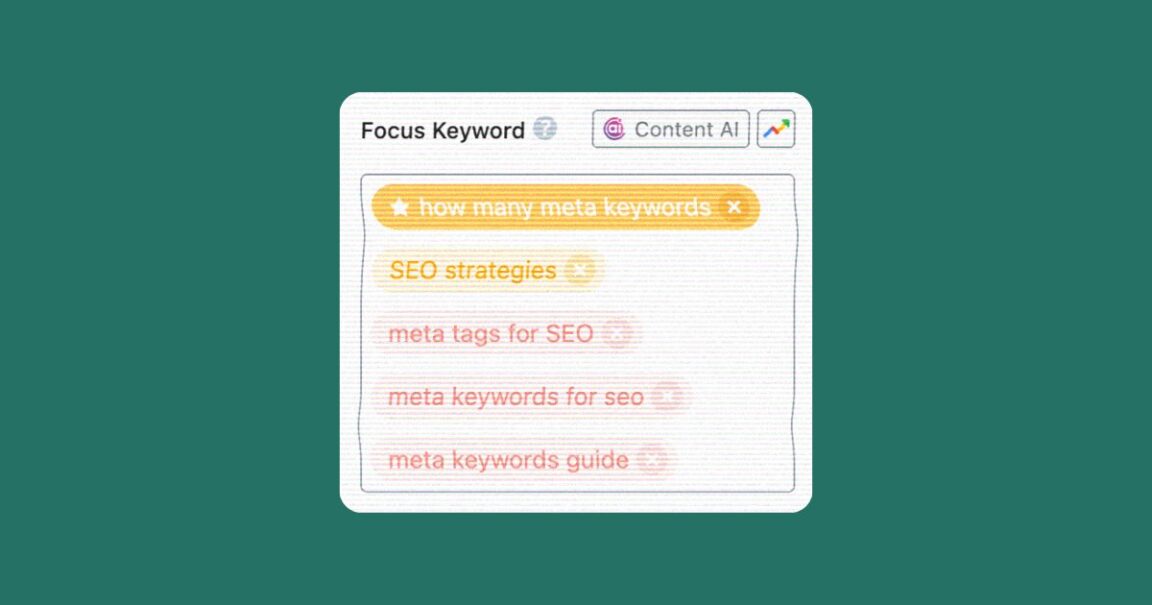Are you wondering how many meta keywords you should use to improve your website’s SEO? Or, are you asking yourself whether meta keywords even matter anymore? Let’s cut through the confusion. While SEO strategies have evolved significantly, meta keywords still come up in discussions—especially for those new to optimizing websites.
This blog post will explore whether you should use meta keywords, how they impact SEO, and what alternatives you should focus on for better results. By the end, you’ll have a clear understanding of meta keywords and actionable tips to strengthen your overall SEO game.
Table of Contents
Do Meta Keywords Still Matter for SEO in 2024?
In the early days of search engines, meta keywords played a significant role in helping websites rank higher. However, with the rise of sophisticated search algorithms, including Google’s algorithm updates, meta keywords are no longer a ranking factor.
In 2009, Google officially announced that it does not use the meta keywords tag to rank websites. Bing and Yahoo also stopped considering meta keywords as a factor in their rankings.
Key Takeaway
Don’t focus on meta keywords as a ranking tactic. Instead, prioritize high-quality content, user experience, and on-page SEO factors.
Also read: How Many Backlinks Per Day Is Safe? Avoid Google Penalties
How Many Meta Keywords Should You Use, If At All?
Even though meta keywords don’t directly influence rankings, you might still consider using them in specific scenarios:
- Internal Organization: Some CMS platforms or analytics tools may utilize meta keywords for internal tracking or reporting.
- Non-Google Search Engines: Niche search engines or legacy systems might still reference meta keywords.
If you decide to use them:
- Limit yourself to 5-10 highly relevant keywords.
- Avoid stuffing unnecessary or unrelated keywords to prevent appearing spammy.
- Ensure these keywords align with your content.
Why Meta Keywords Are No Longer Relevant for SEO
Here’s why meta keywords have become obsolete in SEO:
1. Keyword Stuffing Issues
In the past, meta keywords were abused by website owners who stuffed them with irrelevant or excessive terms to manipulate search rankings. This led to a poor user experience and made search engines less trustworthy.
2. Search Engines Evolved
Modern search engines like Google rely on semantic search and natural language processing to understand content. They analyze factors such as:
- Content quality
- Backlink authority
- User intent
- Structured data (schema)
3. Focus on Real Content Signals
Instead of relying on meta keywords, search engines now prioritize:
- Title tags and meta descriptions
- H1 and H2 tags
- Page load speed
- Mobile responsiveness
What Should You Focus On Instead of Meta Keywords?
Since meta keywords don’t impact rankings, here are the key areas you should prioritize:
1. Optimize Your Title Tags
Your title tag is one of the most important on-page SEO elements. It should:
- Include your primary keyword naturally.
- Be compelling and under 60 characters to avoid truncation.
2. Craft Compelling Meta Descriptions
While meta descriptions don’t directly influence rankings, they improve click-through rates (CTR). A great meta description:
- Contains your target keyword.
- Is concise (around 155-160 characters).
- Provides a clear summary of the page’s content.
3. Leverage Semantic Keywords
Semantic keywords are related terms that help search engines understand the context of your content. Tools like Google’s People Also Ask section, AnswerThePublic, and SEMrush can help you identify these.
4. Improve Content Quality
- Write content that answers user queries in-depth.
- Use clear headings (H2s, H3s) and structured formatting.
- Include visuals like images, charts, and videos for a better user experience.
5. Build High-Quality Backlinks
Backlinks from authoritative websites signal trust and authority to search engines. Focus on:
- Guest blogging
- Industry collaborations
- Creating link-worthy content
Also read: How to Hide Backlinks From Competitors: 5 Smart SEO Strategies
FAQs: Meta Keywords and SEO
What are meta keywords?
Meta keywords are a type of meta tag that was used to specify the key topics of a web page. While they were important in early SEO strategies, they are no longer relevant for modern SEO.
Should I use meta keywords on my website?
No, meta keywords are not necessary for SEO in 2024. Focus instead on factors like content quality, page speed, and backlinks.
How many meta keywords should I use if required?
If you’re using meta keywords for internal tracking or niche platforms, limit them to 5-10 highly relevant terms.
Can meta keywords harm my SEO?
Yes, overloading meta keywords can make your website appear spammy, which may harm your credibility.
What should I prioritize instead of meta keywords?
Focus on optimizing title tags, meta descriptions, structured data, and content quality for better results.
Conclusion
While the question of “how many meta keywords should I use for SEO” might pop up often, the real answer is simple: they’re no longer relevant. Modern SEO is about delivering value, improving user experience, and staying ahead with high-quality content and technical optimization.
If you’re looking for an agency that understands the latest SEO strategies for maximum results, reach out to Derivate X. We specialize in helping businesses achieve sustainable growth with tailored SEO solutions.



GIPHY App Key not set. Please check settings
2 Comments